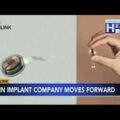Introduction
Elon Musk, the CEO of Tesla and SpaceX, has declared that Neuralink, his neurotechnology company, has successfully implanted its brain implant into a human patient. In a post on X, Musk stated that the patient is recovering well and initial results show promising neuron spike detection. This groundbreaking development marks a significant milestone in the field of neurotechnology and opens up possibilities for individuals with neurological disorders.
FDA Approval and Human Trials
Neuralink received FDA approval to commence human trials in 2023. Despite initial rejection due to concerns over overheating or movement of the implant in the brain, the approval was granted after the necessary safety measures were implemented. This prompted thousands of prospective patients to volunteer for the trial, willing to have a portion of their skull removed for the implantation process. The first patient chosen for the trial had a spinal cord injury resulting in paralysis in all four limbs or a diagnosis of amyotrophic lateral sclerosis (ALS), also known as Lou Gehrig's disease.
The Telepathy Device
Elon Musk revealed that the first product of Neuralink's brain implant is called Telepathy. This device enables users to control their phones, computers, and other devices simply by thinking. The initial focus of this groundbreaking technology is to assist individuals who have lost the use of their limbs. Musk emphasized the potential of this device by envisioning a scenario where Stephen Hawking, the renowned physicist, could communicate faster than a speed typist or an auctioneer.
Potential Applications and Skepticism
Musk has previously claimed that the Neuralink device could potentially solve conditions such as autism and schizophrenia. However, neuroscientists argue that while the technology may be effective at stimulating electrodes and aiding paralyzed or blind patients, it may not have the ability to "solve" mental health conditions or fundamentally alter the brain's developmental architecture. Some experts express skepticism about the claims made by Musk regarding the device's capabilities and its potential for super-enhanced thinking power. They question the feasibility of achieving a symbiotic relationship between humans and artificial intelligence through Neuralink.
Ethical Considerations
The development of Neuralink's brain implant technology has raised ethical concerns. Some experts caution that for-profit medical device companies, like Neuralink, may make grandiose claims to generate a consumer base. While it is crucial to hope for the success of these interventions with minimal adverse side effects, it is equally important to approach these claims with a critical mindset and consider the vested interests behind them.
Conclusion
The successful implantation of Neuralink's brain implant into a human patient marks a significant milestone in the field of neurotechnology. With promising initial results and the potential to assist individuals with neurological disorders, this technology has the capacity to revolutionize the way we interact with devices and process information. However, it is important to approach these advancements with a critical mindset and consider the ethical implications associated with their development. The future of Neuralink and its impact on human cognition and artificial intelligence remains to be seen.
—————————————————————————————————————————————
By: ktangalakislippert@businessinsider.com (Katherine Tangalakis-Lippert)
Title: Elon Musk Announces First Human Patient Receives Neuralink Brain Implant
Sourced From: www.businessinsider.com/elon-musk-claims-first-human-patient-received-neuralink-implant-2024-1
Published Date: Tue, 30 Jan 2024 01:51:38 +0000





Leave a Reply